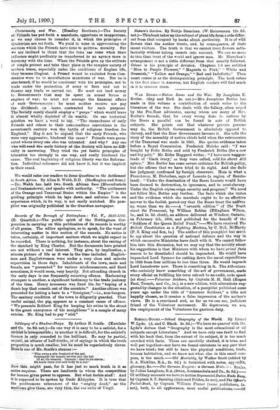W AR Booas.—Native Races and the War. By Josephine E.
Butler. (Gay and Bird. 2s. net.)—Mrs. Josephine Butler has made in this volume a contribution of much value to .the literature a the war. She deals with the fallacy, often urged by the Pro-Boer advocates, among whom are many of Mrs. Butler's friends, that for every wrong done to natives by the Boers a parallel can be found in acts of British subjects. She points out that whatever private persona may do, the British Government is absolutely opposed to slavery, and that the Boer Government favours it. She tells the story of the assembly of native chiefs held when the retrocession of the Transvaal was made in 1881. She quotes evidence taken before a Royal Commission. Frederick Moleho said : "I was bought by Fritz Botha and sold by Frederick Botha (for a cow and big pot)." Mr. Rider Haggard writes : "I have seen waggon- loads of ' black ivory,' as they were called, sold for about £15 apiece." Mrs. Butler has some severe criticism for British policy, but she affirms that we have tried to do right. And she finds her iudgment confirmed by foreign observers. Here is what a Frenchman, M. Dieterless, says of Lessuth (a region of Basuto- land) : "Under the domination of the Boers Lessuto would have been doomed to destruction, to ignorance, and to semi-slavery. Under the English regime reign security and progress," We need not follow Mrs. Butler any further. The facts which she states and the evidence which she marshals ought to be an effective answer to the foolish parrot-cry that the Boers treat the natives worse than we do.—A. "seventh edition" of The Truth about the Transvaal, by William Robins (Effingham Wilson, is., and is. 3d. cloth), an address delivered at Windsor, Ontario, on February 0th, 1900, and published for the benefit of the "Soldiers of the Queen Relief Fund."—We have received The British Constitution as a Fighting Machine, by C. Mel,. MeHardy (P. S. King and Son, le.) The author of this pamphlet has much to say about the question of national defence and the way in which successive Ministries have dealt with it. We cannot follow him into this discussion, but we may say that the novelty about his suggestions is that Ministers with whom we have primd facie reason to be dissatisfied should be impeached. He would have impeached Lord Spenser for cutting down the naval expenditure in 1893 from four millions to less than three. He would impeach Lord Lansdowne now. There is something in it. The Athenians, who certainly knew something of the art of government, made every official on fulfilling his term submit to an audit, so to speak (eb fibro).—Volunteer Soldiers, by Captain M. H. Hall (Kogan Paul, Trench, and Co., ls.), is a new edition, with alterations sug- gested by changes in the situation, of a pamphlet published some years ago under the title of "Amateur Soldiers," a title not happily chosen, as it creates a false impression of the author's views. He is a convinced and, as far as we can see, judicious friend of the Volunteer movement. He deprecates, we see, the employment of the Volunteers for garrison duty.


































 Previous page
Previous page